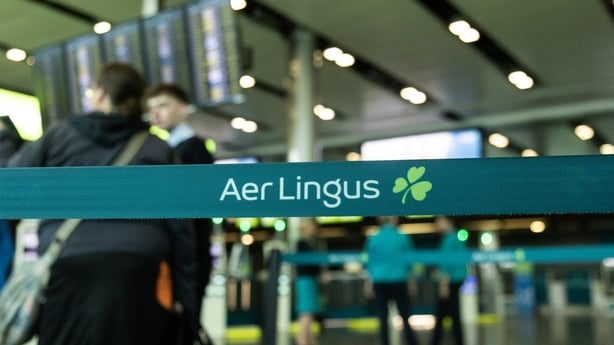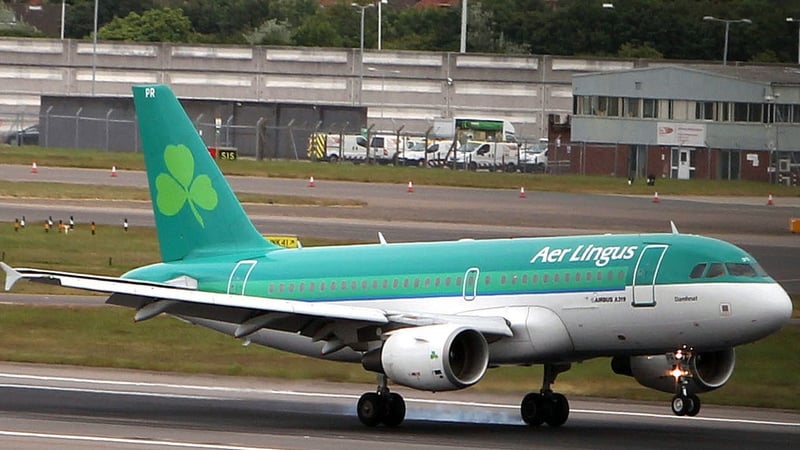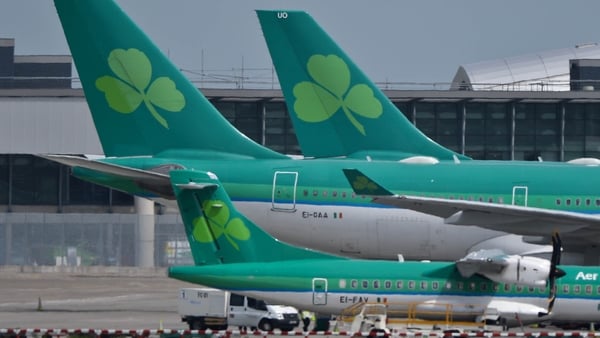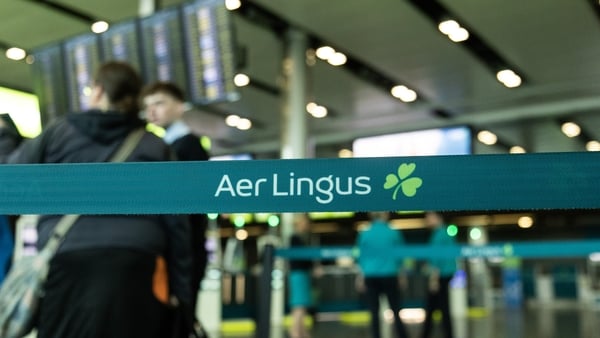Aer Lingus has accepted a Labour Court recommendation of a 17.75% pay increase for pilots in a bid to resolve a long-running pay dispute at the airline.
The recommendation, which was made earlier, covers a four year period from 1 Jan 2023 to the end of December 2026.
The decision is not binding and it will now be put to a ballot of members of the Irish Airline Pilots' Association (IALPA).
IALPA President Captain Mark Tighe said the executive of the union will consider the court decision before issuing a recommendation to members on whether to accept or reject the proposals.
"I'm not going to comment on the details of the recommendation, other to confirm that we have it and now the executive has to consider it," Cpt Tighe said.
"There are a number of our members who are actually flying today and haven't even seen it yet, so we would hope to have a full executive meeting by tomorrow afternoon.
"In the meantime, there are a couple of items in it that we need to confirm our understanding of," he said.
"This is perfectly normal any time a document is published, the company may well be doing something similar themselves.
"Once we have confirmation of our understanding, the executive will then be able to make a decision as to whether to recommend acceptance or rejection," Cpt Tighe added.
We need your consent to load this rte-player contentWe use rte-player to manage extra content that can set cookies on your device and collect data about your activity. Please review their details and accept them to load the content.Manage Preferences
Once IALPA decides on its recommendation it will conduct an electronic ballot. It will also hold members' meetings allowing it to answer any questions that pilots may have.
Industrial action by pilots has so far led to the cancellation of 548 flights up until Sunday 14 July.
Chief Corporate Affairs Officer at Aer Lingus Donal Moriarty said the recommendation from the Labour Court provides for flexibility and productivity changes.
"The main mechanism that the court decided to use was an increase in the term of the agreement from three years to four years," Mr Moriarty said.
"They also recommended that an agreement which provided more flexibility in terms of summer leave come to an end at the end of 2024.
"So that represents a change in terms of productivity and flexibility for 2025, 2026 and indeed beyond," he added.
In a statement earlier, Aer Lingus said that the "airline will have to consider the longer-term implications of implementing the recommendation and of this dispute which has been enormously damaging both financially and reputationally".
"Aer Lingus encourages Fórsa/IALPA and pilots to accept the recommendation of the Labour Court and end their industrial action," the statement added.

Minister hopeful of resolution
Minister for Agriculture Charlie McConalogue said he was hopeful for a resolution to an "immensely stressful situation".
He told RTÉ's Drivetime: "It's been a really stressful time for, for many people across the country who have been booking and planning their holidays abroad.
"And indeed, it's been a really challenging time as well for many people coming into the country and the impact that has on our tourism industry and our economy as well.
"We would hope for a resolution of this because certainly it has been an immensely stressful situation for so many people at a really important time of year".
Aer Lingus management and IALPA attended a Labour Court hearing on Wednesday.
Last Monday, the court met with the two sides for more than eight hours before informing the parties that it would exercise its right to intervene in the dispute under the Industrial Relations Act.
The Labour Court asked that there be no escalation of the dispute, but an indefinite work-to-rule by IALPA members is remaining in place.
On Saturday 29 June, pilots took part in an eight-hour strike.
IALPA is seeking a pay rise of up to 24% to take account of inflation since their last wage increase in 2019.
However, Aer Lingus is seeking agreement on productivity and flexibility in return for any pay increases that go beyond the 12.25% agreed with other groups of workers at the company.
IALPA has warned that it will consider escalating its industrial action if no agreement is reached.
The Labour Court has recommended that the 17.75% increase be awarded as follows:
- 2% with effect from 1 January 2023
- 1.75% with effect from 1 July 2023
- 2% with effect from 1 October 2023
- 3.5% with effect from 1 January 2024
- 1.5% with effect from 1 October 2024
- 3% with effect from 1 January 2025
- 3% with effect from 1 January 2026
- 1% with effect from 1 July 2026
The court recommended that agreed 2022 pay scales be terminated on the date of acceptance of the recommendation and that pilots should revert to a single scale from that date.
It also said that the elimination of elements of a 'debt' owed by pilots should stand, notwithstanding the termination of the 2022 scales.
"The court recommends that the contested elements of these agreements, including the entire 'Crewing Agreement', and all elements of either agreement associated with rostering/summer leave etc., giving rise to 'debt' currently owed by pilots, be regarded as unsustainable and inoperable and that these elements should now be regarded as terminated by agreement at the end of 2024," the court said.
"In the event that either party should propose to enter an agreement in the future addressing these same matters, any such claim should be pursued as a fresh claim through normal procedures as necessary," it added.
The Labour Court also recommended that an overnight allowance to be increased by 10% with effect from the date of acceptance of the recommendation and a further 5% with effect from 1 October 2025.
In its recommendation, the Labour Court noted that it met the parties on 25 June and 1 July to establish if it could assist in finding a resolution.
"The court understood from its engagements with the parties on both of these occasions that the potential exists for a very grave and unfavourable outcome to this trade dispute should resolution not be found in the short term," the recommendation stated.
"Similarly, the court came to understand that, notwithstanding their extensive engagements directly and with the assistance of a series of expert bodies, no discernible narrowing of the gap between the parties' respective positions on key matters, or indeed their disputation on matters of fact, had emerged," the Labour Court said.






